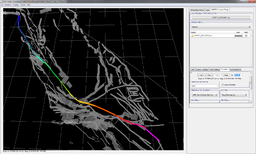CyberShake Meeting - 4 April 2012
From SCECpedia
Jump to navigationJump to searchCyberShake Meeting Goals
- Develop scientific and technical basis for integrating SCEC scientific products including UCERF3.0, CVM, and software into a SCEC CyberShake calculation.
- Develop computational methods and techniques that will enable us to scale-up a CyberShake 1.0Hz PSHA calculation to 5000 sites using UCERF3.0
Agenda & Presentations
Introduction and Meeting Goals
- 09:00 Welcome, Goals, and Objectives (T. Jordan)
- 09:05 CyberShake Overview (P. Maechling)
- 09:15 Recent CyberShake Production Runs (S. Callaghan)
CyberShake Hazard Model Analysis
- 09:30 Analysis of CyberShake Results (F. Wang)
- 09:45 CyberShake Validation using PBR (G. Biassi/J. Donovan)
- 10:00 Higher Frequency (1.0Hz and 10.0Hz) CyberShake Hazard Curves
- 10:15 Break
UCERF3.0 PSHA Calculation Elements
- 10:30 UCERF3.0 versus UCERF2.0 (N. Field)
- 10:45 CyberShake California CVM (P. Chen)
- 11:00 UCERF3.0 Extended ERF (R. Graves)
- 11:15 CyberShake Processing Software (P. Maechling)
- 11:30 Discussion
- 12:00 Lunch
- 10:00 Sensitivity Studies for CVM and Ruptures at 0.5Hz (T. Jordan)
- 12:30 Lunch
HPC Software Developments
- 13:00 AWP-ODC-SGT and AWP-ODC-GPU (Y. Cui)
- 13:15 Hercules (R. Taborda)
- 13:30 AWP-Graves (R. Graves)
- 13:45 Workflows on Track 1 (G. Mehta)
- 14:00 Blue Waters Status (J. Alameda)
- 14:15 Discussion
- 14:30 Break
CyberShake Computational Plans
- 14:45 Data products and publication planning (P. Maechling)
- 15:00 CyberShake computational phases (T. Jordan)
- 15:15 Initial Northern California Hazard Curve evaluation process (B. Aagaard)
- 15:30 Discussion and Next Steps (T. Jordan/G. Beroza)
- 16:00 Adjourn
